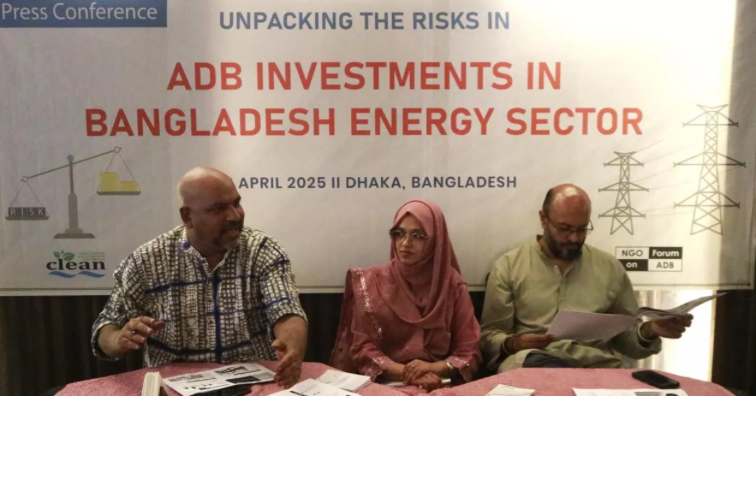Up to 65pc of ADB’s energy investments in Bangladesh lack safeguard classification: NGO Forum


A coalition of private watchdog groups has revealed that approximately 65 per cent of the Asian Development Bank’s (ADB) energy investments in Bangladesh—totaling $11.36 billion—lack any safeguard classification, raising serious concerns over transparency and accountability.
The revelation came during a press conference titled “Unpacking the Risks in ADB’s Investments in Bangladesh,” held at Banglamotor in the capital. The event was jointly organised by the NGO Forum on ADB and the Coastal Livelihood and Environmental Action Network (CLEAN), ahead of the ADB’s 58th Annual General Meeting, UNB reports.
Speakers at the event accused the multilateral lender of deepening Bangladesh’s energy and environmental crises by adhering to a one-sided investment model that heavily prioritizes fossil fuels over renewable alternatives.
Hasan Mehedi, Chief Executive of CLEAN; Rayyan Hassan, Executive Director of the NGO Forum on ADB; and Sharmin Bristy, Fossil Fuel Campaigner at the NGO Forum on ADB, spoke at the event.
They said that the ADB has so far invested around $17.34 billion in Bangladesh’s energy sector, with the vast majority funneled into fossil fuel-based projects.
According to their analysis, the ADB has supported 106 energy projects in Bangladesh since 1973, many of which focus on fossil fuel-based power generation, oil and gas distribution, and related transmission infrastructure. Of these, 67 projects worth $9.84 billion have already been closed—raising concerns over the bank’s planning, sustainability, and long-term strategy.
“Only 7.95 per cent of total project funds were allocated to high-risk environmental considerations, while a mere 0.35 per cent—around $60.58 million—was designated for resettlement and community safeguards,” said Sharmin Bristy. “These figures cast serious doubt on ADB’s commitment to sustainable development.”
Rayyan highlighted the stark funding disparity between fossil fuel and renewable energy projects. Of the $4.88 billion ADB has invested in electricity generation in Bangladesh, 82.9 per cent went to fossil fuel-based initiatives. In contrast, only 2.55 per cent was allocated to solar energy—and not a single dollar to wind power.
“The cost per megawatt also reveals a troubling trend,” he added. “Fossil fuel projects receive $2.04 million per MW, while solar receives only $0.51 million.”
Hasan Mehedi criticised ADB’s investment in a 165-kilometer gas pipeline from Bheramara to Khulna, despite knowing Bangladesh lacks sufficient gas reserves. He said the ADB went on to finance two gas-based power plants in Khulna—one of 225 MW capacity and another of 800 MW—which have remained idle due to gas shortages.
“These projects are now burdens on the people. As a multilateral development bank, ADB should not fund such unsustainable initiatives,” he said.
Mehedi emphasised that Bangladesh, being on the frontlines of the climate crisis, needs support for renewable solutions—not fossil fuel dependency. “ADB must urgently change its energy policy and commit to a full transition to renewables,” he added.
The NGO Forum on ADB and CLEAN concluded the event by outlining three core demands to the ADB including ending all fossil fuel financing and supporting a just energy transition, Implementing robust safeguards, including Free, Prior, and Informed Consent (FPIC), and upholding human rights.
Rejecting carbon markets, green washing practices, and corporate-led pseudo climate solutions were among other demands.


 For all latest news, follow The Financial Express Google News channel.
For all latest news, follow The Financial Express Google News channel.